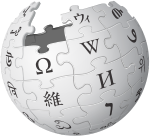Wikipedia

Wikipedia (/ˌwɪkɪˈpiːdiə/ (About this sound listen), /ˌwɪkiˈpiːdiə/ (About this sound listen) WIK-ih-PEE-dee-ə) is a multilingual, web-based, free-content encyclopedia project supported by the Wikimedia Foundation and based on a model of openly editable content. Wikipedia is the largest and most popular general reference work on the Internet,[3][4][5] and is named as one of the most popular websites.[6] The project is owned by the Wikimedia Foundation, a non-profit which "operates on whatever monies it receives from its annual fund drives".[7][8][9]
Wikipedia was launched on January 15, 2001, by Jimmy Wales and Larry Sanger.[10] Sanger coined its name,[11][12] a portmanteau of wiki[notes 4] and encyclopedia. There was only the English-language version initially, but similar versions in other languages quickly developed, which differ in content and in editing practices. With 5,602,198 articles,[notes 5] the English Wikipedia is the largest of the more than 290 Wikipedia encyclopedias. Overall, Wikipedia comprises more than 40 million articles in 299 different languages[14] and, as of February 2014, it had 18 billion page views and nearly 500 million unique visitors each month.[15]
As of March 2017, Wikipedia has about 40,000 high-quality articles, known as Featured Articles and Good Articles, that cover vital topics.[16][17] In 2005, Nature published a peer review comparing 42 science articles from Encyclopædia Britannica and Wikipedia, and found that Wikipedia's level of accuracy approached that of Encyclopædia Britannica.[18] Time magazine stated that the remarkably open-door policy of allowing anyone to edit had made Wikipedia the biggest and possibly the best encyclopedia in the world and it was testament to the vision of Jimmy Wales.[19]
Wikipedia has been criticized for allegedly exhibiting systemic bias, presenting a mixture of "truths, half truths, and some falsehoods",[20] and, in controversial topics, being subject to manipulation and spin.